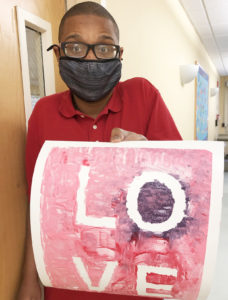Learn, Belong, and Be Recognized
Founded in 1999, Saint Catherine Academy is a state-approved education program for students ages 5 to 21 who have intellectual and developmental disabilities, including autism. Small class sizes allow for integrated learning with a focus on academics, the development of life skills, and vocational experiences.
We recognize that students with multiple, developmental, or intellectual disabilities need a program that combines life skills and core academics to better prepare them for independent living. Saint Catherine Academy offers a careful integration of academics and living/vocational skills delivered in a facility specially designed for our program. Our faculty are state-certified professional educators who holistically address students’ social and academic education, supported by experienced instructional assistants.
Programming
 Using a
combination of individual instruction and small group sessions, as well as
assistive technology, the Academy’s certified special education teachers are
able to assess progress and plan necessary accommodations for each student to
maximize potential. Emphasis is placed in developing and maintaining language
arts skills and math proficiency.
Using a
combination of individual instruction and small group sessions, as well as
assistive technology, the Academy’s certified special education teachers are
able to assess progress and plan necessary accommodations for each student to
maximize potential. Emphasis is placed in developing and maintaining language
arts skills and math proficiency.
Lori Leskin, parent
We recognize that students with multiple, developmental, or intellectual disabilities need a program that combines life skills and core academics to better prepare them for independent living. Saint Catherine Academy offers a careful integration of academics and living/vocational skills delivered in a facility specially designed for our program. Our faculty are state-certified professional educators who holistically address students’ social and academic education, supported by experienced instructional assistants.
Vocational Experience
Social Skills
Life Skills
Creative Arts
Academics
Vocational Experience
Social Skills
Life Skills
Life Skills
The development of life skills is integrated into the curriculum and all activities in collaboration with occupational, physical, speech therapists, and social workers.
Our facility includes a Life Skills Apartment with a kitchen, bedroom, bathroom, and washer/dryer. Activities in the apartment, such as making the bed, setting the table, emptying the dishwasher, and preparing food give students the opportunity to learn and practice in an environment similar to home.
Sami looks forward to going to the Center every day. She loves going out to the van each morning, peering in to see who is there to pick her up – usually with a big smile on her face. As a mother of a non-verbal child, seeing that smile on her face is extremely comforting, assuring me that she is happy to be on her way.
Creative Arts
Sami looks forward to going to the Center every day. She loves going out to the van each morning, peering in to see who is there to pick her up – usually with a big smile on her face. As a mother of a non-verbal child, seeing that smile on her face is extremely comforting, assuring me that she is happy to be on her way.


